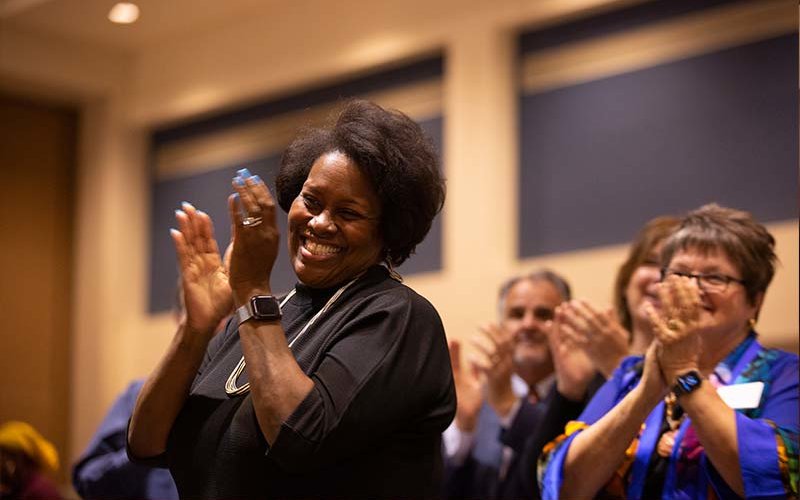
When considering the words “black excellence,” Gwendolyn Alexis says she found herself “traveling back in time.”
The keynote speaker of the Feb. 27 Black History Month President’s Reception took her audience on a journey to “the continent of Africa, in a civilization older than time,” to the great libraries of Timbuktu and the kingdoms of Queens Amina, Sheba and Nefertiti.
“Then there were human beings whose names we will never know — our ancestors, shining examples of excellence and strength of body, mind and spirit.
“My ancestors were stolen and put on ships, on this trip of horror called Middle Passage,” said Alexis, a lecturer in Cal State Fullerton’s Department of African American Studies, referring to the millions of Africans forcibly brought to the New World as slaves.
“Once they were stolen, kidnapped, whatever you want to call it, they were taken to parts unknown.
And yet their black excellence shined.
This excellence gave our ancestors the strength to build this country we call the United States of America. Over 200 years of free labor helped make this country into the economic giant it is today.”
Alexis spoke of the discrimination of black soldiers fighting for the country in WWII, of the marches of the 1950s and 60s and the continuing struggle of the African American community.
“We march, we protest and we die for the world to recognize this excellence,” said the activist.
The reception was hosted by President Fram Virjee and his wife, Julie, in partnership with Diversity Initiatives and Resource Centers.

President Fram Virjee reaffirms CSUF’s commitment to the success of African American students.
In his welcome remarks, Virjee acknowledged the contributions of African American students, alumni, faculty and staff and recognized former CSUF Presidents Milton Gordon and Jewell Plummer Cobb, two of the first African American university presidents in the United States.
“As my pride for all that we are doing to welcome and support African American Titans and to help them grow, so, too, does my concern that not every student feels the warmth of our embrace or the boost of our support; that our outreach has some blind spots; and worst of all, that there are still some among us who feel unwelcome or invisible,” said Virjee.
“I thank the African American faculty, staff and students who have come to me with similar sentiments, and I want to take this opportunity to pledge to them and all of you, that you are seen, you are heard, and as a campus community, we can and will get better. Not just by listening to the voices who come forward, but by listening to the silences from those who do not yet feel empowered to come forward.”
Virjee cited the 2019 Campaign for College Opportunity report, “State of Higher Education for Black Californians,” which indicates that 57 percent of African Americans do not earn their degree within six years.
“We are actually ahead of the curve on this front, with a 64 percent six-year graduation rate for African American students,” he stated.
Further, the Race and Equity Center’s 50-State Report Card on “Black Students at Public Colleges and Universities” created an equity index score for 506 public institutions that measured four quadrants of African American representation and success. Cal State Fullerton’s index score, said Virjee, was higher than the national average, higher than the statewide average, and higher than the equity index score of 48 out of the 50 states.